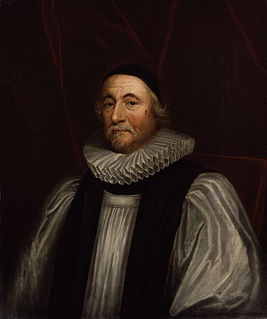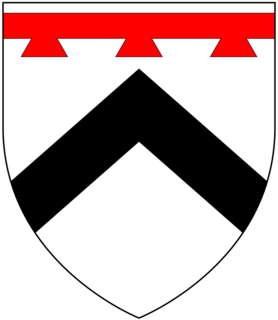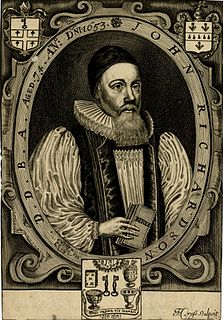Related Research Articles

James Ussher was the Church of Ireland Archbishop of Armagh and Primate of All Ireland between 1625 and 1656. He was a prolific scholar and church leader, who today is most famous for his identification of the genuine letters of the church father, Ignatius of Antioch, and for his chronology that sought to establish the time and date of the creation as "the entrance of the night preceding the 23rd day of October... the year before Christ 4004"; that is, around 6 pm on 22 October 4004 BC, per the proleptic Julian calendar.
The Regius Professorships of Divinity are amongst the oldest professorships at the University of Oxford and the University of Cambridge. A third chair existed for a period at Trinity College, Dublin.

John Bramhall was an Archbishop of Armagh, and an Anglican theologian and apologist. He was a noted controversialist who doggedly defended the English Church from both Puritan and Roman Catholic accusations, as well as the materialism of Thomas Hobbes.
William Bedell Stanford was an Irish classical scholar and senator. He was Regius Professor of Greek at Trinity College Dublin between 1940 and 1980 and served as the 22nd chancellor of the university between 1982 and 1984.
Nathanael Carpenter was an English author, philosopher, and geographer.

John Prideaux D.D. was an English academic and Bishop of Worcester.
Richard Holdsworth was an English academic theologian, and Master of Emmanuel College, Cambridge from 1637 to 1643. Although Emmanuel was a Puritan stronghold, Holdsworth, who in religion agreed, in the political sphere resisted Parliamentary interference, and showed Royalist sympathies.
Richard Sherlock was a seventeenth-century English priest.
John Parker DD was a Church of Ireland clergyman who came to prominence after the English Restoration, first as Bishop of Elphin, then as Archbishop of Tuam and finally as Archbishop of Dublin and Primate of Ireland.
Robert Harris (1581–1658) was an English clergyman, known as a Puritan preacher, member of the Westminster Assembly, and President of Trinity College, Oxford.
Nicholas Bernard DD was an Anglican priest and author during the 17th Century. A dean in Ireland at the time of the Rebellion of 1641, he wrote descriptions of current events. He was also the biographer of James Ussher.
William Greenhill (1591–1671) was an English nonconformist clergyman, independent minister, and member of the Westminster Assembly.
Robert Ussher (1592–1642) was an Irish Protestant Provost of Trinity College Dublin and Bishop of Kildare.
James Seaton Reid (1798–1851) was an Irish presbyterian minister and church historian.
Nicholas Greaves, D.D. (1605?–1673) was an English churchman who was Dean of Dromore cathedral, County Down.

John Richardson (1580–1654) was an English bishop of the Church of Ireland.
Samuel Mather was an Independent minister. Born in England, he went with his family while still young to New England. He returned to England under the Commonwealth, went to Scotland after a period at Oxford, and became a Fellow of Trinity College, Dublin. After 1662 he was a nonconformist minister in Ireland.
Andrew Sall (1612–1682) was an Irish Jesuit, later a convert to the Church of England.
John Stearne or Sterne (1624–1669) was an Irish academic, founder of the Irish College of Physicians.
References
- ↑ Carr, William, University College , Routledge, 1998. ISBN 978-0-415-18632-2. Chapter VI, The Seventeenth Century to the Restoration, 1660 (page 114).
- ↑ Darwall-Smith, Robin, A History of University College, Oxford. Oxford University Press, 2008. ISBN 978-0-19-928429-0.
- ↑ Alan Ford, James Ussher (2007), pp. 42–43.
- ↑ Dictionary of National Biography , article on Bedell.
- ↑ Daniel Lysons, Stepney, The Environs of London: volume 3: County of Middlesex (1795), pp. 418–488.
- Attribution
![]()
| Academic offices | ||
|---|---|---|
| Preceded by Robert Sanderson | Regius Professor of Divinity at Oxford 1648–1654 | Succeeded by John Conant |
| Preceded by Thomas Walker | Master of University College, Oxford 1648–1654 | Succeeded by Francis Johnson |